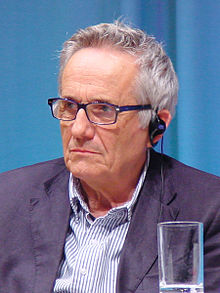Marco Bellocchio
Marco Bellocchio | |
|---|---|
 Bellocchio in 2010 | |
| Born | (1939-11-09) 9 November 1939 Bobbio, Italy |
| Occupation | Film director, screenwriter, actor |
| Years active | 1962–present |
Marco Bellocchio (Italian: [ˈmarko belˈlɔkkjo]; born 9 November 1939) is an Italian film director, screenwriter, and actor.
Contents
1 Life and career
1.1 Films
1.2 Political activity
2 Filmography
3 References
4 External links
Life and career
Born in Bobbio, near Piacenza, Marco Bellocchio had a strict Catholic upbringing – his father was a lawyer, his mother a schoolteacher.[1] He began studying philosophy in Milan but then decided to enter film school, making his first film, Fists in the Pocket, (I pugni in tasca, winner of the Silver Sail at the 1965 Festival del film Locarno), funded by family members and shot on family property, in 1965.
Films
Bellocchio's films include China is Near (1967), Sbatti il mostro in prima pagina (Slap the Monster on Page One) (1972), Nel Nome del Padre (In the name of the Father – a satire on a Catholic boarding school that shares affinities with Lindsay Anderson's If....) (1972), Victory March (1976), A Leap in the Dark (1980), Henry IV (1984), Devil in the Flesh (1986), and My Mother's Smile (2002), which told the story of a wealthy Italian artist, a 'default-Marxist and atheist', who suddenly discovers that the Vatican is proposing to make his detested mother a saint.
In 1991 he won the Silver Bear – Special Jury Prize at the 41st Berlin International Film Festival for his film The Conviction.[2]
In 1995 he directed a documentary about the Red Brigades and the kidnapping of Aldo Moro, entitled Broken Dreams. In 2003, he directed a feature film on the same theme, Good Morning, Night. In 2006 his film The Wedding Director was screened in the Un Certain Regard section at the 2006 Cannes Film Festival.[3] In 1999 he was awarded with an Honorable Prize for the contribution to cinema at the 21st Moscow International Film Festival.[4]
In 2009 he directed Vincere, which was in the main competition at the Cannes Film Festival. He finished Sorelle Mai, an experimental film that was shot over ten years with the students of six separate workshops playing themselves. He was awarded with the Golden Lion for Lifetime Achievement at the 68th Venice International Film Festival in September 2011.[5]
His 2012 film Dormant Beauty was selected to compete for the Golden Lion at the 69th Venice International Film Festival.[6] On 6 September 2012, Bellocchio condemned the Catholic Church's interference in politics after the premiere of his new controversial film about a high-profile euthanasia case. The film approaches the topic of euthanasia, and the difficulty setting of legislation on end of life in a country, Italy, which has within its borders Vatican City. The subject is inspired by Eluana Englaro's case. Following the decision of the jury of the Venice Film Festival, which has ruled the film from the Golden Lion, Bellocchio has expressed strong criticism against President Michael Mann.[7]
Political activity
Bellocchio made a big impact on radical Italian cinema in the mid-sixties, and was a friend of Pasolini. In 1968 he joined the Communist Union, and began to make politically militant cinema. However, in a 2002 interview, he remarked, "I can talk about my personal ideas but Marxism has little to do with it now. Today politics means administration. No party is now proposing a radical change of anything, and radical change is no longer very interesting to me as an artist."[8] He is an atheist.[9] He was candidate for Italian Parliament in 2006, with Rose in the Fist list, a political cartel made by socialists and Italian Radicals (a liberal, social liberal and libertarian party).
Filmography
Abbasso il zio (1961)
La colpa e la pena (1961)
Il ginepro fatto uomo (1962)
Fists in the Pocket (1965)
China is Near (1967)
Il popolo calabrese ha rialzato la testa (1969) – co-direction
Viva il 1º maggio rosso proletario (1969) – co-direction
Discutiamo, discutiamo, episode of Love and Anger (1969) – co-direction
Nel nome del padre (1972)
Sbatti il mostro in prima pagina (1972)
Matti da slegare (1975), co-directed with Silvano Agosti, Sandro Petraglia, Stefano Rulli
Victory March (1976)
Il gabbiano (1977)
La macchina cinema (1979), co-directed with Silvano Agosti, Sandro Petraglia, Stefano Rulli
A Leap in the Dark (1980)
Vacanze in Val Trebbia (1980)
The Eyes, the Mouth (1982)
Henry IV (1984)
Devil in the Flesh (1986)
The Witches' Sabbath (1988)
The Conviction (1991)
The Butterfly's Dream (1994)
Sogni infranti (1995) – TV documentary
The Prince of Homburg (1996)
La religione della storia (1998) – TV documentary
The Nanny (1999)
L'affresco (2000)
Elena (2002)
Appunti per un film su Zio Vanja (2002)
Addio del passato (2002)
My Mother's Smile (2002)
Good Morning, Night (2003)
The Wedding Director (2006)
Sorelle (2006)
Vincere (2009)
Sorelle Mai (2010)
Dormant Beauty (2012)
Blood of My Blood (2015)
Sweet Dreams (2016)
References
^ The Independent Review, p.14, 15 November 2002
^ "Berlinale: 1991 Prize Winners". berlinale.de. Retrieved 22 March 2011..mw-parser-output cite.citationfont-style:inherit.mw-parser-output qquotes:"""""""'""'".mw-parser-output code.cs1-codecolor:inherit;background:inherit;border:inherit;padding:inherit.mw-parser-output .cs1-lock-free abackground:url("//upload.wikimedia.org/wikipedia/commons/thumb/6/65/Lock-green.svg/9px-Lock-green.svg.png")no-repeat;background-position:right .1em center.mw-parser-output .cs1-lock-limited a,.mw-parser-output .cs1-lock-registration abackground:url("//upload.wikimedia.org/wikipedia/commons/thumb/d/d6/Lock-gray-alt-2.svg/9px-Lock-gray-alt-2.svg.png")no-repeat;background-position:right .1em center.mw-parser-output .cs1-lock-subscription abackground:url("//upload.wikimedia.org/wikipedia/commons/thumb/a/aa/Lock-red-alt-2.svg/9px-Lock-red-alt-2.svg.png")no-repeat;background-position:right .1em center.mw-parser-output .cs1-subscription,.mw-parser-output .cs1-registrationcolor:#555.mw-parser-output .cs1-subscription span,.mw-parser-output .cs1-registration spanborder-bottom:1px dotted;cursor:help.mw-parser-output .cs1-hidden-errordisplay:none;font-size:100%.mw-parser-output .cs1-visible-errorfont-size:100%.mw-parser-output .cs1-subscription,.mw-parser-output .cs1-registration,.mw-parser-output .cs1-formatfont-size:95%.mw-parser-output .cs1-kern-left,.mw-parser-output .cs1-kern-wl-leftpadding-left:0.2em.mw-parser-output .cs1-kern-right,.mw-parser-output .cs1-kern-wl-rightpadding-right:0.2em
^ "Festival de Cannes: The Wedding Director". festival-cannes.com. Retrieved 15 December 2009.
[permanent dead link]
^ "21st Moscow International Film Festival (1999)". MIFF. Archived from the original on 22 March 2013. Retrieved 2013-03-23.
^ "Cannes Film Festival to honour jailed Iranian directors". BBC News. 11 May 2011. Retrieved 11 May 2011.
^ "Venezia 69". labiennale. Archived from the original on 28 July 2012. Retrieved 26 July 2012.
^ "Anger Bellocchio on Venice jury".
^ Bellocchio, speaking to the journalist Roger Clarke, The Independent Review, 15 November 2002
^ "Interview to Studiocinema". Archived from the original on 26 March 2012.
External links
Marco Bellocchio on IMDb
